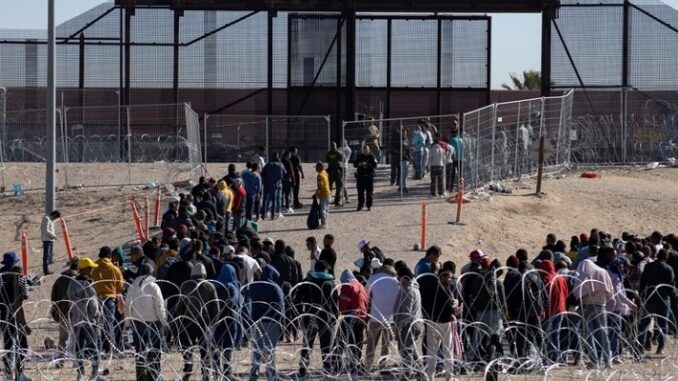Kamala Harris has been criticized by Republicans for not “fixing” immigration. But let’s consider for a moment the ideas from the other side. Let’s talk about mass deportations.
Not about the wrenching cruelty it would necessarily involve: separating undocumented parents from their citizen children; forcing American kids to drop out of school to follow mom and dad to an unknown future over the border. Let’s not talk about the devastation it would inflict on the economy, which would be deprived, at a stroke, of about 5 percent of its workforce.
Let’s, rather, talk about the logistics of the enterprise — the implications for law enforcement, the judiciary and the bureaucracy at large. Taken together, the logistical hurdles are formidable. This suggests that though Trump might really be itching to deport people by the millions, he will fail.
Consider the numbers for a moment. According to estimates from the Department of Homeland Security, there are some 11 million unauthorized immigrants in the United States. They are to be found all across the country: 1.8 million in California, 95,000 in Oklahoma, 5,000 in Wyoming.
(There isn’t, however, even a consensus on the meaning of the term. The DHS defines illegal immigrants as those who have not been either legally admitted or paroled. But there are hundreds of thousands of migrants paroled into the United States under Biden administration programs that have been challenged in court as illegal by governors of Republican-controlled states.)
Just finding all of these folks will be a Sisyphean challenge. There are people harvesting strawberries near Fresno, Calif., or apples in Washington state’s Yakima Valley, landscaping in Georgia and building homes in Arizona, and cleaning hotel rooms in Houston. They run kitchens in restaurants across urban America and care for the babies of citizen mothers all over the place.
The United States has never rid itself of people at this scale. The most immigrants “removed” in a single year by Immigration and Customs Enforcement, the authority in charge of weeding out unauthorized immigrants inside the United States rather than at the border, was 432,334 in 2013. At that pace, Trump’s plan would take decades.
Consider Trump adviser Stephen Miller’s plan to hold America’s undocumented in “large-scale staging grounds near the border.” It would take almost five cities the size and density of Houston to house 11 million people. If, instead, they are quickly expelled as Trump prefers, the government would need a lot of planes. ICE flew 1,651 removal flights in the year leading up to July. Flying 11 million people out would require 58,201 flights in fully loaded Boeing 737-800s.
Even the low-hanging fruit will be hard to pick. U.S. Citizenship and Immigration Services has a backlog of about 1.3 million immigrants in asylum proceedings. Justice Department officials are working through an additional case backlog of 3.7 million, of which 1.1 million are requesting asylum. These people would presumably be easier to eject once a court decided on their case.
The Justice Department has about 700 immigration judges to deal with its 3.7 million cases, which works out to about 5,300 cases per judge. USCIS, which processes some asylum cases, is also having trouble working through its backlog. Some of its cases have been pending for more than 10 years.
Getting a court order does not end the problem. There are 1.3 million immigrants at large out there who are already subject to a removal order. Some judge has already denied whatever claim they thought they had to stay. The government hasn’t deported them because (a) it can’t find them, (b) it doesn’t have space to keep them, (c) it lacks the buses and planes to ship them out and/or (d) their home country won’t take them back.
Trump and his friends at Project 2025 share a fantasy in which they are freed from the constraints of law. They deputize the National Guard from red states to round up immigrants, including those sheltering in uncooperative blue states. They raid schools, hospitals and churches. They expeditiously deport at will — never mind due process or that the migrant at hand faces torture and death at home. They don’t ask.
This scenario requires an even more drastic suspension of disbelief, however. What happens if troops from the Indiana National Guard try to round up immigrants huddled inside a church protected by Chicago police? I’m guessing Trump would prefer not to incite another Civil War.
Mass expulsions would be illegal even under a nationwide rollout of “expedited removal,” a process expanded during the Trump administration which limits immigrants’ right to see a judge before being kicked out. It cannot be applied to immigrants who have been in the United States longer than two years. But some 9 million of the 11 million have been in this country since before 2010.
Trump’s team admits that it can’t happen all at once. “Let’s start with 1 million,” said his VP pick, Sen. JD Vance of Ohio. “And then we can go from there.” The precedent Trump likes talking about is the Eisenhower administration’s Operation Wetback, which used military tactics to expel about 1.1 million immigrants in 1954. Some of the details of that operation, however, suggest it wouldn’t fly today.
Critically, the operation had the support of American farmers, who hired the unauthorized workers to harvest their crops. How come? Because it was accompanied by a large expansion of the Bracero program, which allowed them to hire more Mexicans legally. As Michael Clemens of George Mason University put it, Operation Wetback was “mostly a shift of unauthorized to authorized migration.”
In general, though, employers have not appreciated deportation waves, such as those carried out during the George W. Bush and Obama administrations. One notorious raid seeking undocumented workers in the Vidalia onion fields of Georgia in 1998 sparked a furious letter-writing campaign from farmers to members of Congress. Sen. Paul Coverdell (R-Ga.) quickly complained to the Immigration and Naturalization Service about the “indiscriminate and inappropriate use of extreme enforcement tactics.” If nothing else deters Trump, I’m betting an angry letter from his business friends will.
.
Eduardo Porter is an editorial writer and columnist at The Washington Post. He formerly worked at the New York Times, the Wall Street Journal, Bloomberg Opinion and Notimex. He is the author of “American Poison” and “The Price of Everything.” Twitter



